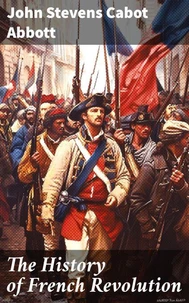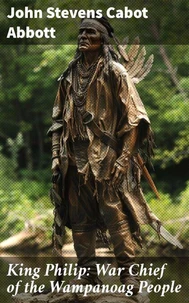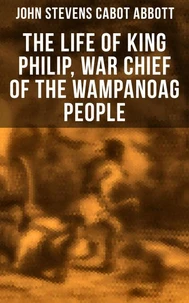King Philip: War Chief of the Wampanoag People
Par :Formats :
Disponible dans votre compte client Decitre ou Furet du Nord dès validation de votre commande. Le format ePub est :
- Compatible avec une lecture sur My Vivlio (smartphone, tablette, ordinateur)
- Compatible avec une lecture sur liseuses Vivlio
- Pour les liseuses autres que Vivlio, vous devez utiliser le logiciel Adobe Digital Edition. Non compatible avec la lecture sur les liseuses Kindle, Remarkable et Sony
 , qui est-ce ?
, qui est-ce ?Notre partenaire de plateforme de lecture numérique où vous retrouverez l'ensemble de vos ebooks gratuitement
Pour en savoir plus sur nos ebooks, consultez notre aide en ligne ici
- Nombre de pages195
- FormatePub
- ISBN859-65--4775342-1
- EAN8596547753421
- Date de parution14/12/2023
- Protection num.Digital Watermarking
- Taille2 Mo
- Infos supplémentairesepub
- ÉditeurDIGICAT
Résumé
In "King Philip: War Chief of the Wampanoag People, " John Stevens Cabot Abbott delves into the life and significance of Metacom, known as King Philip, who led the Wampanoag tribe during the tumultuous period of King Philip's War (1675-1678). Abbott's narrative intertwines rich historical detail with vivid storytelling, showcasing his commitment to exploring the cultural and social dynamics of Native American life in New England.
The book presents a compelling examination not only of King Philip as a fierce leader but also of the broader struggles between Indigenous peoples and European settlers, framed within the context of colonial expansion and Indigenous resistance in 17th century America. John Stevens Cabot Abbott, a prolific 19th-century American historian and biographer, was profoundly influenced by his surroundings in New England and his interest in educational reform.
His background in teaching and history equipped him with the tools to convey complex ideas with clarity and empathy. Abbott's dedication to unveiling the often-overlooked perspectives of Native Americans reflects not only his scholarly pursuits but also an underlying advocacy for cultural understanding during a time of rampant colonization. This work is a must-read for scholars of American history, Indigenous studies, and those interested in the complexities of cultural conflict.
Abbott's insightful prose brings to life the struggles and resilience of the Wampanoag people, making it essential for anyone seeking to grasp the rich tapestry of America's past and the legacy of its Native leaders.
The book presents a compelling examination not only of King Philip as a fierce leader but also of the broader struggles between Indigenous peoples and European settlers, framed within the context of colonial expansion and Indigenous resistance in 17th century America. John Stevens Cabot Abbott, a prolific 19th-century American historian and biographer, was profoundly influenced by his surroundings in New England and his interest in educational reform.
His background in teaching and history equipped him with the tools to convey complex ideas with clarity and empathy. Abbott's dedication to unveiling the often-overlooked perspectives of Native Americans reflects not only his scholarly pursuits but also an underlying advocacy for cultural understanding during a time of rampant colonization. This work is a must-read for scholars of American history, Indigenous studies, and those interested in the complexities of cultural conflict.
Abbott's insightful prose brings to life the struggles and resilience of the Wampanoag people, making it essential for anyone seeking to grasp the rich tapestry of America's past and the legacy of its Native leaders.
In "King Philip: War Chief of the Wampanoag People, " John Stevens Cabot Abbott delves into the life and significance of Metacom, known as King Philip, who led the Wampanoag tribe during the tumultuous period of King Philip's War (1675-1678). Abbott's narrative intertwines rich historical detail with vivid storytelling, showcasing his commitment to exploring the cultural and social dynamics of Native American life in New England.
The book presents a compelling examination not only of King Philip as a fierce leader but also of the broader struggles between Indigenous peoples and European settlers, framed within the context of colonial expansion and Indigenous resistance in 17th century America. John Stevens Cabot Abbott, a prolific 19th-century American historian and biographer, was profoundly influenced by his surroundings in New England and his interest in educational reform.
His background in teaching and history equipped him with the tools to convey complex ideas with clarity and empathy. Abbott's dedication to unveiling the often-overlooked perspectives of Native Americans reflects not only his scholarly pursuits but also an underlying advocacy for cultural understanding during a time of rampant colonization. This work is a must-read for scholars of American history, Indigenous studies, and those interested in the complexities of cultural conflict.
Abbott's insightful prose brings to life the struggles and resilience of the Wampanoag people, making it essential for anyone seeking to grasp the rich tapestry of America's past and the legacy of its Native leaders.
The book presents a compelling examination not only of King Philip as a fierce leader but also of the broader struggles between Indigenous peoples and European settlers, framed within the context of colonial expansion and Indigenous resistance in 17th century America. John Stevens Cabot Abbott, a prolific 19th-century American historian and biographer, was profoundly influenced by his surroundings in New England and his interest in educational reform.
His background in teaching and history equipped him with the tools to convey complex ideas with clarity and empathy. Abbott's dedication to unveiling the often-overlooked perspectives of Native Americans reflects not only his scholarly pursuits but also an underlying advocacy for cultural understanding during a time of rampant colonization. This work is a must-read for scholars of American history, Indigenous studies, and those interested in the complexities of cultural conflict.
Abbott's insightful prose brings to life the struggles and resilience of the Wampanoag people, making it essential for anyone seeking to grasp the rich tapestry of America's past and the legacy of its Native leaders.





